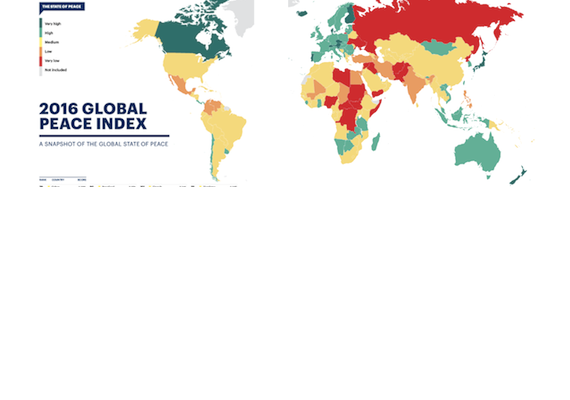By Juan Cole | (Informed Comment) | – –
The 2016 Global Peace Index has been released, with the bad news that the world is slightly more violent this year than last. But much of the increase of violence happened in the greater Middle East, in Syria, Libya, Turkey, etc. If you subtracted the Middle East, in most of the world there was more peace, not less.
Country-wise, 81 countries became more peaceful while 79 became more violent. Libya, Turkey, Bahrain, Ukraine and Yemen were the top five in the “got worse” category. But Sri Lanka, which has emerged from a period of nasty dictatorship to become more democratic and inclusive, improved, as did Thailand, Panama, South Africa and Mauritania (these 5 were ‘most improved’).
Violence is deadly to the economy, and was quite costly to the world last year, to the tune of trillions of dollars.
Regionally, the most improvement came in the Caribbean, Central America and Latin America.
From the end of World War II until 2005 or so, despite the Korean and Vietnam Wars, violence actually declined substantially throughout the world. But in the past 10 years it has gradually increased, reversing the earlier secular trend. In these ten years, battlefield deaths, deaths from terrorism, and displacement of people by conflict have all increased. Last year the number of refugees created, 60 million, was the highest since the world was in the midst of WW II.
The averages are skewed, however, by the Middle East, and especially by Syria, the most violent country in the world last year. The US invasion and occupation of Iraq kicked off massive violence there and in neighboring countries (ISIL would not own part of Syria if its parent organization hadn’t been formed in 2003 to fight the US occupation of Iraq).
If you subtracted the Middle East, the rest of the globe actually got slightly more peaceful last year.
One bright spot is that world spending on UN peacekeeping is way up.
Europe is the most peaceful place in the world, with no violence to speak of. Last year that peace was interrupted by some major terrorist attacks. But they seem so shocking and bulk so large because the continent’s norm is so placid.
A lot of the increase in violence has been in the Muslim Middle East. But, of the 20 most violent countries, it is important to note that many have a Christian background– South Sudan, Central African Republic, Ukraine, Democratic Republic of the Congo, Russia, Colombia and Venezuela. One is Communist/ Confucianist (North Korea); and one is Jewish/Muslim/ Christian (Israel).
The Global Peace Index thinks there are 8 correlates of increased peace:
Equitable distribution of resources
Acceptance of the rights of others
Low levels of corruption
Well-functioning government
Free flow of information
Good relations with neighbors
High levels of human capital
Sound business environment
As for my own country, it sees to me obvious that it is deteriorating along a number of these criteria. Distribution of resources, including education and even clean water, is becoming less equitable. One of our two major presidential candidates has built his campaign on refusing to accept the rights of others. Corruption in Wall Street and US politics seems endemic. Self-censorship and interruption of information flows have increased because of the Snowden revelations of government surveillance (a form of corruption and a threat to free information all rolled up together). If the GPI is right about what produces peace, you’d have to conclude that the US is heading toward increased violence.
—-
Related video:
RECTV: “India ranked 141 in Global Peace Index”




 © 2026 All Rights Reserved
© 2026 All Rights Reserved